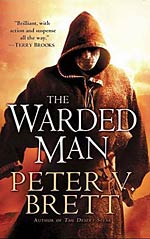
![]() Nymeria
Nymeria
4/28/2014
![]()
I've had this book on my radar for quite some time now, but it kept being shuffled down my reading list in favor of other titles. Now that I finally got around to it, I'm sorry I waited so long - even though I can comfort myself with the notion that in the meantime two other books in the series have been published, so I can look forward to lose myself into this world once again.
The premise of the book is interestingly unusual: each night, as darkness reclaims the world, demonic creatures rise from the ground to attack and kill people, whose only defense are magic symbols ("wards") painted or etched on doors and walls. Precious little is given to the reader about these demons and it's mostly the stuff of long-forgotten legends or a sort of religious dogma, but what's fascinating here are the hints about a different, more advanced and pro-active past. What's interesting is that the demons all seem to be related to natural elements like wind, water, fire, stone and so on, which makes me wonder if there is not some connection to that more technologically-oriented past and if these creatures are not the result of some experiment gone horribly wrong. The occasional mention of "the arrogance of our ancestors" would seem to point in that direction.
The first impression that comes out of this situation is that of a divided humanity, broken into settlements whose distance from one another is measured not by space but by the time it takes to cross between them: anything that's further than a day's travel is deemed dangerous if not deadly, because only Messengers dare to brave the night and its demons, thanks to their hard training, courage and portable wards - and even those measures don't offer the certainty of survival.
Unfortunately, when past history transforms (or de-evolves) into legends, the glories of that past become something to look at with wonder while they cease to become the inspiration for a more aggressive stance against the plague of demons. The physical division I was mentioning before seems to have robbed most people of the will to fight, as they focus more on survival and therefore seem headed toward stagnation, and ultimately defeat if - as it's often mentioned - their numbers are dwindling while the demons keep coming out of the depths in inexhaustible numbers.
The three protagonists of the book are indeed shaped to become the force that will break this stalemate, and the reason I enjoyed reading their individual stories is that not one of them is depicted as hero material or predestined savior, in the "honored tradition" of fantasy literature: their lives are quite ordinary, though liberally touched with grief and loss that shape their personalities and direct their actions. The author's choice of developing the story through their separate points of view makes for a fast pace and keeps the narration interesting: in a way this choice mirrors the separation that keeps humans distant from each other, and so the three main characters grow in ignorance of the others' existence.
Even though this kind of story-telling can be at times frustrating, because it's undeniable that once launched on a track a reader wants to know "what happens next", still this constant change of point of view held my eager attention and kept me marching through the book at a fast clip. Even though it's clear from early on that the three are destined to meet, the fact that their encounter is postponed until almost the end of the book - and that it happens in very dramatic circumstances - adds a further measure of attraction to the story-line.
Since the protagonists receive the author's focused attention throughout the book, at times the "guest characters" somewhat suffer from a lack of depth (with a few notable exceptions like one of my very favorites, herb gatherer Bruna) even though they move through the story with ease and believability.
But of course the scene needs to be dominated by Arlen, Leesha and Rojer, whose lives we follow from childhood on: of the three I must admit that Arlen is the most interesting one, especially because Mr. Brett chooses a peculiar path of evolution for him, one that does not necessarily lead to enlightenment and glory but rather moves downward on some dark roads, so that it's clear he needs the other two to remain in contact with his humanity. This is true, however, for Leesha and Rojer as well, each in his or her own way, and I like very much the idea of a... chorus of heroes working in unity, rather than the solitary figure that would be the norm in this kind of story.
This focus on characters works somewhat against the development of the world's background as well as that of the minor players, but still I think that the glimpses readers are afforded are more than enough to let the imagination fill in the rest: Mr. Brett does a wonderful work of showing instead of telling (a quality I admire and enjoy), and there is always the hope that the next books will add more details to the overall picture, building on the foundations that have been laid in this first installment. To say I look forward to more of this would be a huge understatement...
http://spaceandsorcery.blogspot.it